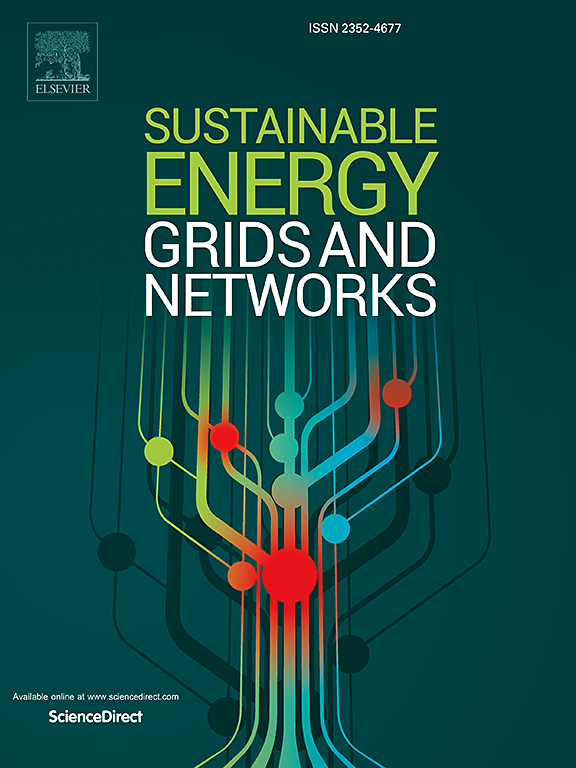关联不确定性下孤立微电网分布式最优资源控制策略
IF 5.6
2区 工程技术
Q2 ENERGY & FUELS
引用次数: 0
摘要
由于可再生能源对气象因素的过度依赖导致的输出不确定性影响着孤立微电网的优化运行。此外,微电网因用电方式和规模不同而产生的需求波动叠加严重影响了分布式能源的最优控制。针对上述问题,我们设计了一种双域柔性负载驱动的分布式架构,以解决微电网中时间和功率柔性域的需求不平衡问题。具体而言,我们首先通过Copula函数测量PV和负荷预测误差的概率,即条件概率密度函数(PDF)。在此基础上,提出了一种基于CopCDC的相关离散卷积(CopCDC)算法来计算网络负荷的不确定性范围。最后,提出了一种关联不确定性算法下的分布式最优资源控制策略(DOC-CU),针对不同的der实现博弈策略交换和个体最优,保证微网整体最优一致性。结果表明,提出的DOC-CU算法用户支出降低18.4% %,微网效益提高15.4% %,微网成本降低13.5 %,处罚支出降低65.5 %,用户满意度提高24.5% %。本文章由计算机程序翻译,如有差异,请以英文原文为准。
Distributed optimal resource control strategy under correlated uncertainties in isolated microgrid
The output uncertainties caused by the excessive dependence of renewable energy sources (RES) on meteorological factors affect the optimal operation of isolated microgrids. In addition, the superposition of demand fluctuations due to their power usage patterns and different scales severely affects the optimal control of distributed energy resources (DER) in microgrids. To solve the above problems, we design a distributed architecture driven by flexible loads in dual domains to solve the demand imbalance problem in microgrids, i.e., time and power flexible domains. Specifically, we first measure the probability of PV and load prediction error, that is, the conditional probability density function (PDF) by the Copula function. Based on these PDFs, we propose a copula-based correlated discrete convolutional (CopCDC) algorithm to calculate the uncertainty range of netload. Finally, a distributed optimal resources control strategy under correlated uncertainties algorithm(DOC-CU) is proposed, for different DERs to achieve game strategy exchange and individual optimum, guaranteeing the overall optimal consistency of the microgrid. The results show that the DOC-CU algorithm proposed has an 18.4 % reduction in user expenditures, a 15.4 % increase in microgrid benefits, a 13.5 % reduction in microgrid costs, a 65.5 % reduction in penalty expenditures, and finally a 24.5 % increase in user satisfaction.
求助全文
通过发布文献求助,成功后即可免费获取论文全文。
去求助
来源期刊

Sustainable Energy Grids & Networks
Energy-Energy Engineering and Power Technology
CiteScore
7.90
自引率
13.00%
发文量
206
审稿时长
49 days
期刊介绍:
Sustainable Energy, Grids and Networks (SEGAN)is an international peer-reviewed publication for theoretical and applied research dealing with energy, information grids and power networks, including smart grids from super to micro grid scales. SEGAN welcomes papers describing fundamental advances in mathematical, statistical or computational methods with application to power and energy systems, as well as papers on applications, computation and modeling in the areas of electrical and energy systems with coupled information and communication technologies.
 求助内容:
求助内容: 应助结果提醒方式:
应助结果提醒方式:


